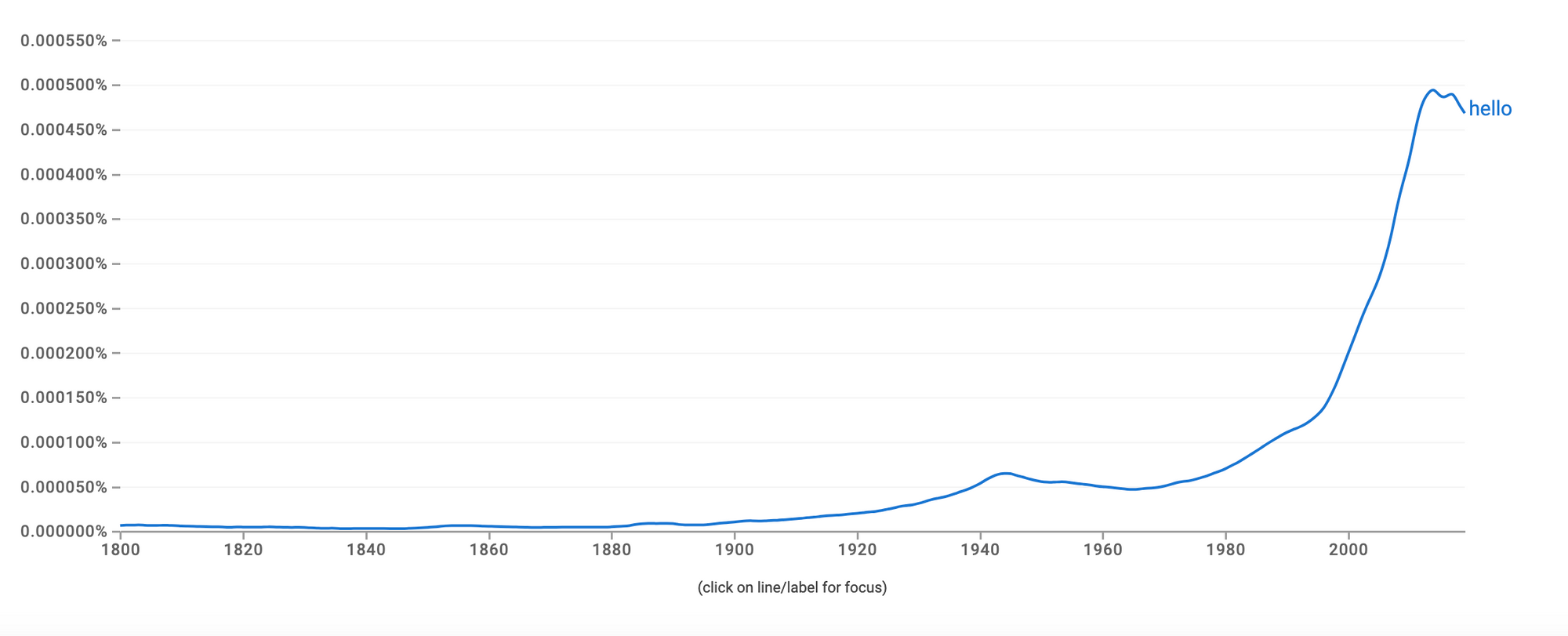- Hellow: "Hellow" is a misspelling of the word "hello." It can be used as a playful variation for "hello," but it should not be used for formal, or academic settings.
- Hello: "Hello" is a common and widely recognized English greeting. It is used to acknowledge someone's presence or to initiate a conversation. It is a friendly and formal way to say "hi" or "hey."

Below are real life examples of the usage of hello:
👋 Answering the Phone: "Hello, this is [Your Name]. How can I help you today?"
👋 Online Communication: "Hello everyone! I hope you're having a great day. Let's dive into today's discussion."
👋 Professional Setting: "Hello colleagues, I'd like to present the latest updates on our project."

The Oxford English Dictionary documents the earliest recorded instance of the term "hello" dating back to October 1826 in the pages of the Norwich Courier of Connecticut. This word gained widespread recognition when Thomas Edison popularized it as a standard phone greeting, refining it after its initial introduction by Alexander Graham Bell, who initially encouraged the use of "ahoy."
In the graph below, you can see that "hello" has a become standard way of greeting someone, so let's figure out the correct usage and details of the word, "hello."


When and How to Use
The usage of "Hellow" and "Hello" is quite straightforward:
Hellow
Although hellow is a misspelling, you can reserve "hellow" for informal or playful situations. It's a bit of an eccentric or outdated choice, so use it sparingly, perhaps when you want to add a touch of whimsy to your greeting.
Example sentence
Informal and Playful Greeting:
- "Hellow, party people! Ready to have some fun tonight?"
Hello
Use "hello" in everyday conversations, whether in person, on the phone, or in written messages. It is suitable for formal and informal situations and is widely accepted across the English-speaking world.
The placement of "hello" in a sentence generally depends on the context and the purpose of its usage. Here are a few examples to illustrate different placements:
- At the Beginning of a Sentence:
- "Hello, how are you today?"
- "Hello, everyone! Welcome to the party."
- Mid-Sentence Greeting:
- "I wanted to say hello and wish you a fantastic day."
- As an Exclamation:
- "Hello! That was an unexpected surprise!"
- In Informal Writing:
- "I just wanted to drop you a quick hello."
- As a Question:
- "You said hello to her, didn't you?"
- In a Formal Introduction:
- "Hello, my name is Alex. Nice to meet you."

More examples from the web
"Yet as the US president admitted after delivering the greeting "Hello Berlin!" – which despite its lack of oratory prowess drew huge cheers from the Berlin crowds at the Brandenburg Gate on Wednesday – times have changed." - The Guardian
"I waved a cheery hello to a man who looked suspiciously like Tony Bennett and stumbled out into the humid Manhattan night, wondering how the hell I was going to find the 7 subway back to Queens." - The Guardian - Film
"As you walk towards your pitch, fellow campers greet you, usually with a cheery wave and a hearty hello." - The Guardian - Travel
Remembering the distinction between those two words is relatively simple:
👋 "Hellow" is a quirky variation of "hello," and its use should be limited to informal or whimsical contexts.
👋 "Hello" is the standard and widely accepted form of greeting. It's the default choice for most situations.
🖊️ Goodmorning or Good Morning: Which is Correct?
🖊️ How Have You Been? The Socially Acceptable Responses
Synonyms
Synonyms for Hellow (informal or playful greetings):
- Howdy: "Howdy, partner! Ready for a rootin' tootin' good time?"
- Salutations: "Salutations, my fellow adventurers! What's the plan for today?"
Synonyms for Hello:
- Hi: "Hi there, how are you doing?"
- Hey: "Hey, it's been a while! How's life treating you?"
- Greetings: "Season's greetings to you and your family."
Antonyms
Antonyms for Hellow (informal or playful greetings):
- Serious: "It's time to get serious; no more fooling around."
- Formal: "In this formal setting, let's keep our greetings dignified."
Antonyms for Hello:
- Goodbye: "Saying goodbye is always bittersweet."
- Farewell: "The farewell party was a heartfelt send-off."

Common Idioms
While "hellow" and "hello" are not typically found in idiomatic expressions, the concept of greeting others plays a significant role in various idioms. Some common idioms related to greetings include:
- Roll out the red carpet: To give someone a very enthusiastic and formal welcome.
- Give someone the cold shoulder: To intentionally be unfriendly or unresponsive to someone.
- Meet someone halfway: To make a compromise to resolve a disagreement or conflict.
Summary
In summary, "hellow" is a playful and less common variation, best reserved for informal or whimsical situations. "Hello" is the standard, universally recognized greeting in English, suitable for all occasions. Remember the distinction, choose your greeting wisely, and always consider the context and your audience when using these words. Whether you decide to get creative by choosing "hellow" or opt for the formal version "hello," the important thing is to make a positive and friendly connection when reaching out to others.
Want to sound like a native speaker?
Engram’s AI-powered grammar checker makes your English sound like a native speaker’s, suggesting natural English expressions on top of fixing grammar, spelling, punctuation, word order, and vocabulary.

Reference:















